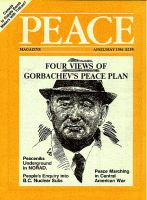
Peace Magazine Apr-May 1986, page 23. Some rights reserved.
Search for other articles by Norman Rubin here
The largest nuclear utility in Canada-Ontario Hydro-is preparing to sell the U.S. tritium, a key ingredient in bomb manufacturing That the U.S. military calls its "number 1 weapons priority."
Officials in Ottawa and at Ontario Hydro, who expect millions of dollars from the sales, claim That foreign buyers can be trusted not to divert our tritium (which is vital to every type of nuclear weapon) into bombs.
But leading experts in the U.S. and Canada disagree: At a minimum, they say, our tritium will boost The nuclear arms race by lending moral support to the current weapons buildup. At the worst, Canada could provide enough strategic material to add hundreds of extra nuclear bombs to the U.S. stockpile.
Exports to the U.S. could begin as early as next year, in quantities that will put Ontario Hydro in the forefront of tritium production: Its first full year of output should yield about four kilograms of purified tritium-as much as the entire U.S. military used in 1980, and about 10 times today's total civilian use worldwide.
To combat growing opposition to such exports, which are becoming a big public issue, Ontario Hydro financed a report which says that few precautions are needed to prevent tritium misuse.
But the report's reassuringly upbeat conclusion, which claims the backing of an impressive list of U.S. experts, is hotly disputed by those experts themselves, many of whom express shock at the way the report misrepresents their views. According to Dr. Gordon Thompson, consulting scientist with Union of Concerned Scientists, the report's interpretation of his views was "pernicious."
Far from agreeing with the report, Admiral Eugene J. Carroll of the Center for Defense Information, calls it "specious rationalization" to deny that tritium exports would add to the U.S. arsenal. In his view, Canadian tritium sales would unavoidably help the U.S. military, particularly since the U.S. "is engaged in the production of 1500 nuclear weapons a year and has a shortage of tritium to meet weapons goals."
Even if Canada's tritium goes only to civilian customers-who are now supplied by the U.S. military -- it will free up the military's reactors to produce either more tritium or plutonium, the other key bomb ingredient
One expert blowing the whistle on this deal is physicist Dr. Thomas Cochran, co-author of The Nuclear Weapons Databook, who argues that the U.S. military will capitalize on Canada's exports to produce plutonium for weapons. "Any tritium imported to the U.S. will increase the plutonium in The U.S. nuclear weapons stockpile," he insists. Echoing his views is Dr. Frank von Hippel, past Chairman of the Federation of American Scientists, who calculates that Ontario Hydro's first year tritium supply alone could add enough plutonium to the U.S. arsenal for "on the order of 100 nuclear warheads."
Although the plan to export tritium comes straight from Ontario Hydro, there are signs that the giant utility may be prepared to do an about-face. Ontario Hydro's own Board has recently announced that a final decision to sell tritium has not been made, and may not be reached until March or April.
But while Hydro's resolve may be flagging, the new Liberal government in Ontario, which was critical of tritium sales before taking office, has been silent on the subject since the election. According to Premier David Peterson's office, the Ontario Cabinet will review Hydro's decision after it is made.
If tritium exports do get the green light from Ontario Hydro and the provincial government, they still face a hurdle in Ottawa. Although federal bureaucrats recently sent a confidential draft policy on tritium exports to Cabinet Ministers Joe Clark, James Kelleher, and Pat Carney for their approval "as soon as possible," the Cab met may be reluctant to buck a Canadian public that increasingly opposes Canada's exports of nuclear materials and technology: According to a CBC poll earlier this winter, no fewer than 62 percent of Canadians now favor a halt to all nuclear exports. The Cabinet may also note that Canada's peace movement, which was once concerned almost exclusively with the U.S. and the Soviet Union, is now focusing on tritium as part of the need to clean up our own act:
Whatever the official decision on tritium exports, the controversy is focusing more and more public attention on the links between Canada's multi-billion dollar nuclear industry and the nuclear arms race. That attention can only sharpen the conflict between public opinion and Canadian policy.

Peace Magazine Apr-May 1986, page 23. Some rights reserved.
Search for other articles by Norman Rubin here